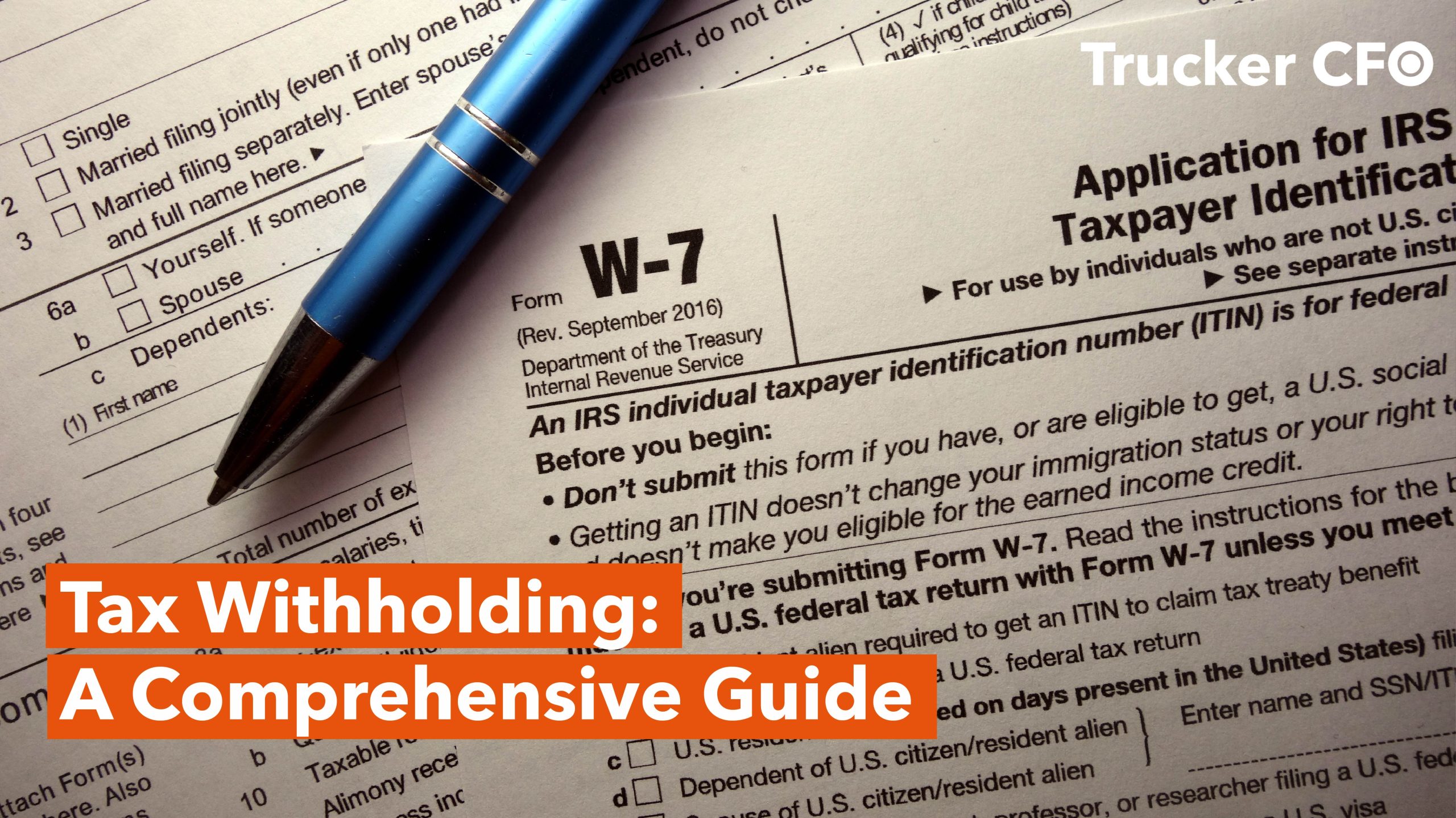
Keeping What You Earn
Everyone wants to keep as much of their hard-earned money as possible, but taxes can make that a challenge. Knowing the basics and staying up to date on tax withholding regulations can help you put more money in your pocket. In this blog post, we’ll delve into the questions surrounding tax withholdings and give tips for maximizing what you take home each paycheck. Whether you’re new to trucking or have been around for a while, read on for key points related to withholding taxes so you can ensure your check is truly reflective of your employer’s compensation offer.
What Is Tax Withholding and Why Is It Important
Tax withholding refers to the amount of money that is taken out of an employee’s pay at each pay period and sent to the government to cover federal, state, and local taxes. It is an important concept for accountants in the trucking industry as it ensures that both employers and employees are meeting their tax obligations. Failure to withhold and remit taxes can result in serious consequences, such as penalties and fines, which could negatively impact a company’s bottom line. Accountants in the trucking industry must be aware of tax withholding regulations and ensure that they comply to avoid any negative financial impact.
Understanding how withholding taxes work for a 1099 contractor versus a W2 employee can feel like deciphering a foreign language. It’s important to know the differences, however, especially if you’re considering becoming a contractor or hiring one. A W2 employee has their taxes withheld by their employer, while a 1099 contractor is responsible for paying their own taxes. This can lead to some confusion and frustration for those who are new to the contracting world. By taking the time to educate yourself on the ins and outs of each payment structure, you’ll be better equipped to make informed decisions and avoid any unexpected surprises come tax season.
Trucking professionals who receive 1099s as owners or contractors don’t have withholding taxes taken out of their pay, so they’re responsible for paying self-employment taxes, which include Social Security and Medicare taxes. The self-employment tax can take a bite out of your earnings coming into your trucking business, especially as you make your quarterly tax payments.
How Tax Withholding Works in the Trucking Industry
Tax withholding is a crucial element to understand when it comes to taxes in the trucking industry. Essentially, this process involves employers taking a portion of an employee’s paycheck and withholding it to cover their income tax liability. For truck drivers, this can become even more complicated, as they often operate on a state-to-state basis, each with its own tax laws and rates. Furthermore, since many truck drivers are classified as independent contractors, they are responsible for their own tax withholding. Therefore, it’s important for truck drivers and operators alike to stay informed on their tax obligations, as non-compliance can result in hefty fines and penalties. Overall, understanding tax withholding is an essential element of navigating the finances of the trucking industry.
Importance of Choosing the Right Business Entity
When starting a business, it’s important to consider the type of entity you want to have and how you plan to pay yourself. This decision can affect your take-home pay and your tax liability. Choosing the right business entity can provide valuable benefits, such as legal protection for personal assets and potential tax savings. Additionally, selecting the right pay structure can help you minimize your tax burden and maximize your income. Understanding the various options available to you and making informed decisions can help you achieve your financial goals and set your business up for success in the long run.
Our team frequently gets questions from owner-operators and fleet owners on wanting to change to a W2 payment structure. Of course, holding a W2 employee status removes the need for self-employment tax. While becoming a W2 employee within your business would appear to have its benefits, the ability to change from 1099 to W2 might not be possible – depending on the type of business entity you have established for your operation.
First of all, there are a number of rules in place from the IRS that determine whether or not your business can be set up to pay W2 income. One of the advantages of utilizing the S-Corp model for your business entity is that you can pay yourself as an employee and utilize the W2. Most often, the questions about converting to W2s are from folks involved in sole proprietorships and partnerships.
When it comes to handling compensation within sole proprietorships and partnerships, the IRS has very strict rules. If you are a sole proprietor, you cannot, by rule, take W2 income. You are not allowed to pay yourself W2 income and receive a paycheck from your business. Similar rules apply to partnerships. The partners are not allowed under tax law to take W2 income from the partnership.
The federal government, through the IRS, wants you to pay into social security and Medicare. If you’re doing that through self-employment tax, you are not supposed to have W2 income. If you are not paying self-employment tax through, say, an S corporation, then you need to accomplish it through W2 income and some type of payroll service.
At Trucker CFO, our team works to actively listen to the details of your unique situation and goals. We take great care to have in-depth conversations with our clients, and we will ask very specific questions about the situation to make sure we understand your plan and what you are trying to accomplish. We understand and respect the fact that no two trucking professionals are alike. Everyone’s specific needs and goals are unique to them. This is why we are dedicated to asking the right questions and ensuring we understand your situation.
Changing your Business Entity Status

As your business grows and evolves, it may become necessary to change your entity status. Whether that means transitioning from a sole proprietorship to an LLC or converting your LLC into a corporation, the process can be complex and time-consuming. However, making the right choice can help protect your personal assets, reduce your tax burden, and enhance your business’s credibility. It’s important to work closely with a reputable attorney and accountant who can guide you through the process and help you make informed decisions. With careful planning and execution, changing your entity status can be a smart and strategic move for your business’s long-term success.
Garnishments & Child Support Payments
Some of the questions that our Trucker CFO team receives when freight is lighter and financial times are tougher are inquiries about lowering the levies and garnishments that you have against your settlements or paychecks. Garnishments and child support payments can be confusing and frustrating topics for many people, but it’s important to understand the basics of wage garnishments and how they impact your tax withholding. When you owe child support, your wages may be garnished to pay for these payments. This can result in a decrease in take-home pay and potentially affect your financial stability. It’s essential to pay attention to your pay stubs and understand any withholding requirements for taxes, as these can also impact your net pay. By staying informed and aware of any garnishments or withholdings, you can better manage your finances and ensure that you meet your financial obligations.
We understand that it may be causing you financial hardship, but you should never go outside the law. You can take steps to alleviate financial hardship by working with your legal counsel on these issues. Depending on your situation and, again, with the advice of proper counsel, you may have bankruptcy or other legally acceptable options available to you.
It is very important to understand that one of the things you cannot be doing is attempt to hide money in other places. You also cannot take steps to lower your income in a way that is against the law or against IRS regulations. Those types of actions are a recipe for trouble. If you are facing these types of challenges, you need good legal counsel to assist you in navigating your way forward.
Common Mistakes to Avoid When Setting up Tax Withholding
When it comes to setting up tax withholding, it can be easy to make common mistakes that can have big consequences. For example, one common mistake is not updating your withholding status when your personal or financial situation changes. This can result in overpaying or underpaying your taxes, leading to penalties or a smaller refund. Another mistake is not properly calculating your allowances. If you claim too many allowances, you may end up owing the IRS, whereas if you don’t claim enough, you may be missing out on money in your paycheck. Additionally, not understanding the differences between federal and state tax withholding can also leave you with unexpected bills or refunds. It’s important to take the time to understand these common mistakes and ensure that you’re setting up your tax withholding correctly to avoid any unnecessary financial stress.
Strategies for Making Sure You Pay the Right Amount of Taxes
Nobody wants to overpay on their taxes, but equally as important is making sure you don’t underpay either. So, what steps can you take to ensure you pay the correct amount? Firstly, keep excellent records of all your annual income and expenses. This will allow you to claim all the deductions and credits you’re eligible for. Secondly, seek assistance from a tax professional to ensure all calculations are correct. They can also provide guidance on any recent tax law changes that affect you. Finally, file your taxes on time to avoid any penalties for late payment or late filing. Following these strategies will give you peace of mind knowing you’ve done everything possible to pay the right amount of taxes.
What to Do if You Owe Money on Your Tax Return
Tax season can be stressful, especially if you owe money on your tax return. But don’t panic! There are steps you can take to handle the situation. First, it’s important to file your return on time to avoid any penalties. Then, assess your options for paying off your balance, such as setting up a payment plan with the IRS or applying for a loan. It’s also a good idea to review your financial habits and make any necessary adjustments to avoid owing money in the future. Remember, owing money on your tax return is not the end of the world, and with some strategic planning, you can tackle the debt and move forward with peace of mind.
All in all, taxation withholding is an important topic for trucking professionals to become well-versed in. It may seem intimidating at first, but understanding the basics can greatly help you save money and maximize your overall take-home pay. Knowing the difference between a 1099 and W2 status is crucial, as this will be a major factor in determining how much you pay or owe come tax time. Furthermore, when setting up a business entity, it’s important to ensure it accurately reflects your business type. Additionally, by avoiding common mistakes during the set-up process and taking into consideration tips for maximizing your take-home pay, you will be well prepared to manage any tax payments or discrepancies that arise. Ultimately, being diligent about understanding the basics of taxation withholding will ensure that your taxes are handled properly and without worry or stress.
Do you have questions about your business entity setup and how you can set up your company’s compensation payments? Do you have questions related to withholding or estimated taxes? Our Trucker CFO Team is ready to help. We are always glad to share the perspectives and experience that we’ve gained from many years of working with professional drivers and trucking business owners. We would like to invite you to connect with the Trucker CFO Team.
